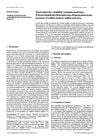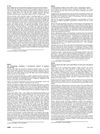 24 citations,
October 2014 in “Cold Spring Harbor Perspectives in Medicine”
24 citations,
October 2014 in “Cold Spring Harbor Perspectives in Medicine” Genetic research has advanced our understanding of skin diseases, but complex conditions require an integrative approach for deeper insight.
 23 citations,
January 2020 in “Central-European Journal of Immunology/Central European Journal of Immunology”
23 citations,
January 2020 in “Central-European Journal of Immunology/Central European Journal of Immunology” Alopecia areata, a type of hair loss, is likely an autoimmune disease with a genetic link, but its exact cause is still unknown.
 16 citations,
February 2018 in “BMC Genomics”
16 citations,
February 2018 in “BMC Genomics” Certain genetic markers linked to reproductive potential were identified by their impact on a protein's ability to bind to genes.
 15 citations,
January 1987 in “Electrophoresis”
15 citations,
January 1987 in “Electrophoresis” Human head hair proteins can be typed into eight distinct patterns, useful for genetic and forensic investigations.
 9 citations,
January 2017 in “Annals of Dermatology”
9 citations,
January 2017 in “Annals of Dermatology” The study found genetic differences related to hair development that may explain hair loss in a patient with Trichorhinophalangeal syndrome type I.
 6 citations,
June 2018 in “Journal of pediatric endocrinology & metabolism/Journal of pediatric endocrinology and metabolism”
6 citations,
June 2018 in “Journal of pediatric endocrinology & metabolism/Journal of pediatric endocrinology and metabolism” Patients with the same genetic mutation for vitamin D-resistant rickets showed different symptoms but all improved with treatment except for hair loss.
 5 citations,
July 2000 in “Southern Medical Journal”
5 citations,
July 2000 in “Southern Medical Journal” Male pattern baldness is often genetic and linked to a hormone, with treatments like finasteride and minoxidil being effective for some men.
 5 citations,
January 1998 in “Clinical and experimental dermatology”
5 citations,
January 1998 in “Clinical and experimental dermatology” Myotonic dystrophy should be considered in patients with hair thinning, and genetic counseling is important.
 1 citations,
January 2021 in “Prague medical report”
1 citations,
January 2021 in “Prague medical report” Men might have a version of the female disease, polycystic ovarian syndrome, shown by changes in hormone levels and early baldness, but more research is needed to fully understand it.
Certain genes may influence hair loss differently in men and women.
 May 2014 in “Journal of The American Academy of Dermatology”
May 2014 in “Journal of The American Academy of Dermatology” The project aimed to understand how genetic test results affect patients' actions and feelings in dermatology.
 September 2023 in “The Journal of clinical endocrinology and metabolism”
September 2023 in “The Journal of clinical endocrinology and metabolism” Genetic risk for PCOS can affect children's growth, metabolism, and development from early life into adulthood.
 May 2014 in “JAMA Dermatology”
May 2014 in “JAMA Dermatology” Mother and son diagnosed with a rare genetic hair loss condition with no effective treatment.
 98 citations,
June 2008 in “Human mutation”
98 citations,
June 2008 in “Human mutation” A genetic change in the EDAR gene causes the unique hair traits found in East Asians.
 62 citations,
August 2014 in “BMC Endocrine Disorders”
62 citations,
August 2014 in “BMC Endocrine Disorders” New findings explain how genetic changes, body clocks, and certain molecules affect tissue response to stress hormones.
 47 citations,
February 2015 in “European Journal of Clinical Investigation”
47 citations,
February 2015 in “European Journal of Clinical Investigation” The review suggests thorough evaluation and genetic testing for proper diagnosis and treatment of Chrousos syndrome.
 11 citations,
May 2011 in “World Journal of Pediatrics”
11 citations,
May 2011 in “World Journal of Pediatrics” The document emphasizes the importance of correctly identifying and classifying genetic hair disorders to help diagnose related health conditions.
 4 citations,
January 2016 in “International journal of reproduction, contraception, obstetrics and gynecology”
4 citations,
January 2016 in “International journal of reproduction, contraception, obstetrics and gynecology” A certain genetic variation is linked to a higher risk of polycystic ovarian syndrome.
 1 citations,
September 2023 in “Acta dermato-venereologica”
1 citations,
September 2023 in “Acta dermato-venereologica” Certain genetic variants are linked to frontal fibrosing alopecia in Spanish patients.
 1 citations,
December 2018 in “Journal of Cosmetic Dermatology”
1 citations,
December 2018 in “Journal of Cosmetic Dermatology” Men with thinner hair from genetic hair loss may be more likely to have an enlarged prostate.
 1 citations,
September 2023 in “Clinical, cosmetic and investigational dermatology”
1 citations,
September 2023 in “Clinical, cosmetic and investigational dermatology” Certain genetic variants linked to immune response increase the risk of alopecia areata in Taiwanese people.
 March 2024 in “Research Square (Research Square)”
March 2024 in “Research Square (Research Square)” Combining genetic and physical trait analysis improves diagnosis accuracy for monogenic diabetes.
 February 2024 in “Biomedicines”
February 2024 in “Biomedicines” Hormones like androgens, estrogen, thyroid hormones, and stress hormones can contribute to hair loss, and treatments target these hormonal imbalances.
 August 2022 in “Frontiers in genetics”
August 2022 in “Frontiers in genetics” A new genetic change in the DSC3 gene is linked to a rare condition causing hair loss and skin blisters in a child.
30 citations,
November 2019 in “Genetics selection evolution” Chinese domestic goats have unique genetic traits due to domestication and geographic isolation.
 16 citations,
September 2008 in “Dermatologic Therapy”
16 citations,
September 2008 in “Dermatologic Therapy” CAH is a genetic disorder affecting cortisol production and causing hormonal imbalances, with treatment and diagnosis varying by form and symptoms.
 8 citations,
November 2018 in “Australasian Journal of Dermatology”
8 citations,
November 2018 in “Australasian Journal of Dermatology” Frontal fibrosing alopecia in families shows similar signs to individual cases and may have a genetic link.
 2 citations,
March 2021 in “bioRxiv (Cold Spring Harbor Laboratory)”
2 citations,
March 2021 in “bioRxiv (Cold Spring Harbor Laboratory)” Hairless mammals have genetic changes in both their protein-coding and regulatory sequences related to hair.
 2 citations,
January 2013 in “Elsevier eBooks”
2 citations,
January 2013 in “Elsevier eBooks” The document explains the genetic causes and characteristics of inherited hair disorders.

Wild African goats have genetic adaptations for surviving harsh desert conditions.




























